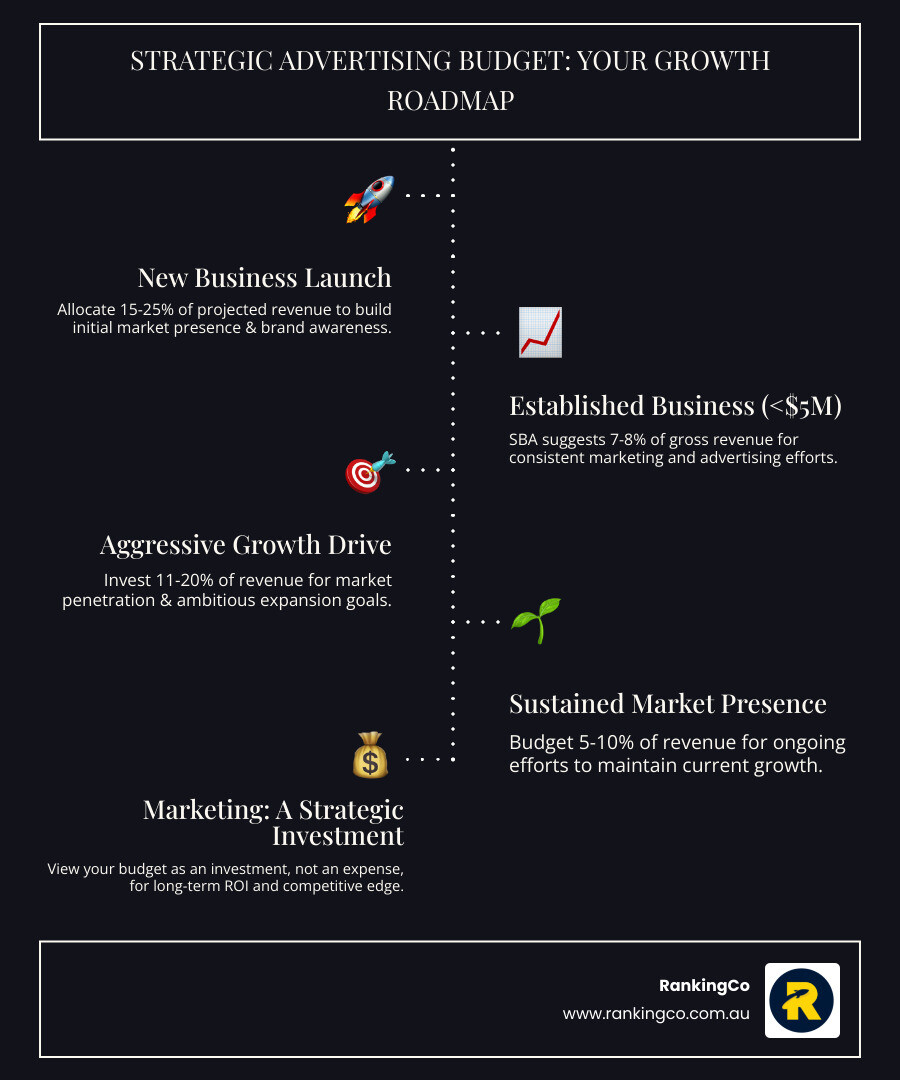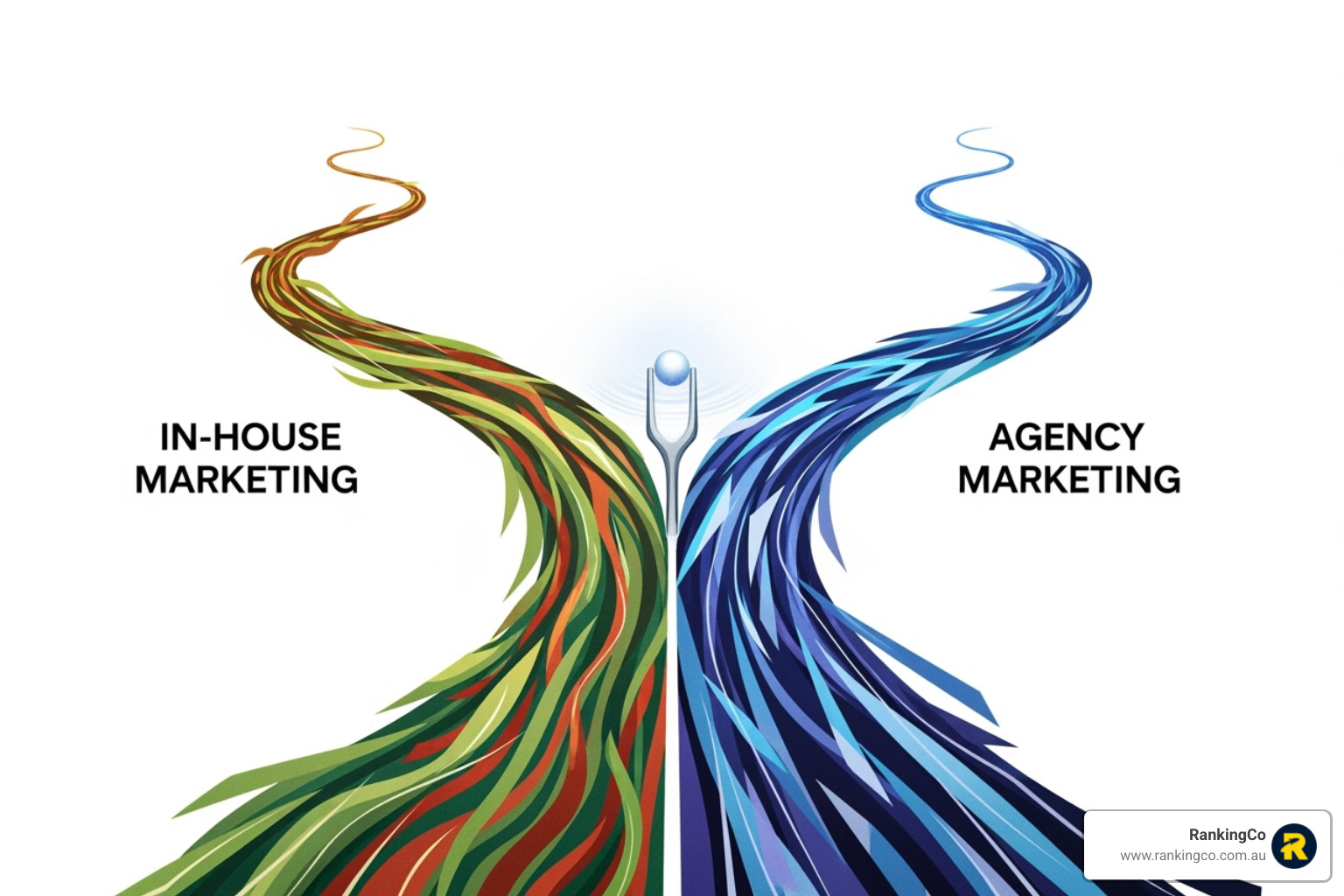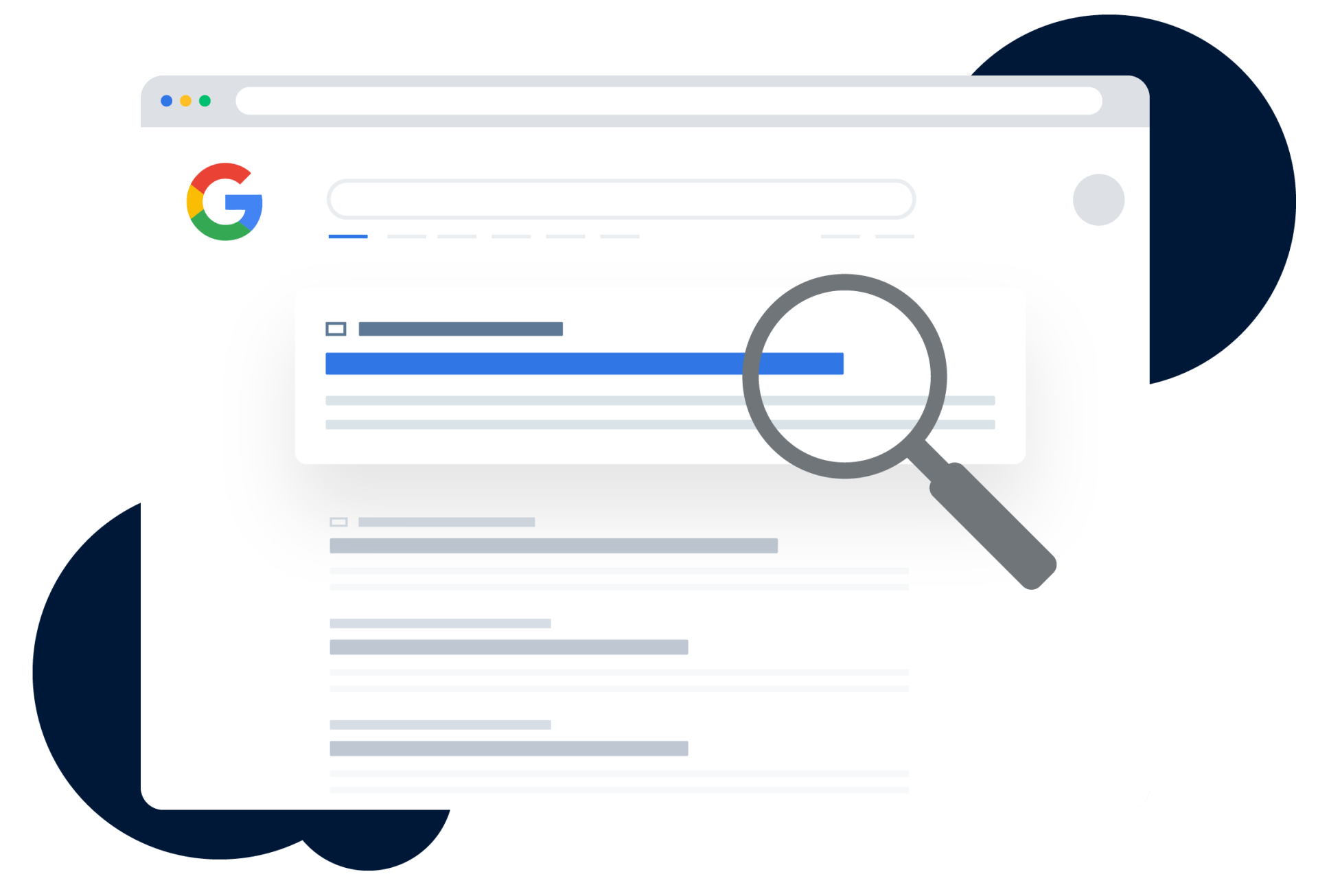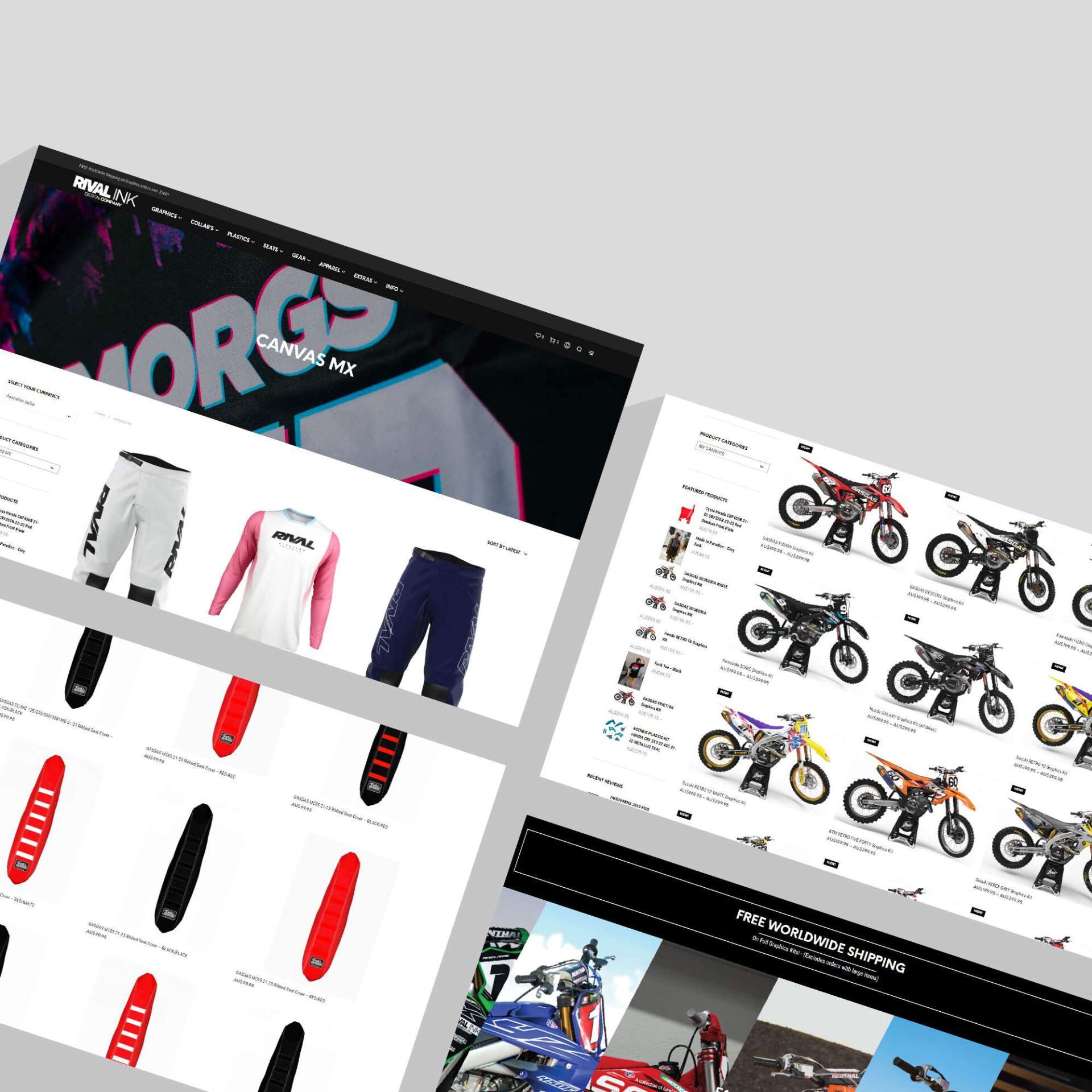Don't Break the Bank: How to Allocate Your Small Business Advertising Dollars Wisely

Open uping Your Advertising Potential

How much money should a small business spend on advertising is a critical question for any entrepreneur. This decision defines your brand's reach, customer acquisition, and long-term success. While no single number fits all, understanding the key benchmarks and influencing factors is vital for making an informed choice that drives growth.
Typically, the ideal advertising spend depends on your business's stage and goals:
- New Businesses : Often allocate 15% to 25% of projected revenue to establish a market presence.
- Established Businesses : A common benchmark is 7% to 8% of gross revenue for marketing and advertising.
- Growth-Oriented Businesses : May invest 11% to 20% of revenue for aggressive expansion and market penetration.
- Businesses Maintaining Growth : A range of 5% to 10% of revenue is common for sustained marketing efforts.
Many small business owners mistakenly view advertising as an expense to be cut during lean times. This is a significant misstep. Marketing is a strategic investment that fuels sales and fosters sustainable growth. Cutting your marketing budget when sales are down can create a vicious cycle, leading to further decline. In contrast, a consistent, well-planned advertising budget maximises your return on investment (ROI) and ensures your brand remains visible and competitive.
At RankingCo, we have seen how strategic budget allocation transforms marketing into a powerful growth engine. Our global expertise in SEO, Google Ads, and data analytics helps startups and scaling businesses build, expand, and thrive in competitive markets.

Why Your Marketing Budget is an Investment, Not an Expense
When considering how much money should a small business spend on advertising , it is essential to shift your perspective. The most successful businesses understand that marketing is not just another cost; it is a powerful investment in your company's future. Viewing marketing as a vital investment is fundamental for sustainable growth and gaining a competitive edge.
Think of your marketing budget as seeds planted for future growth. Each dollar is an investment designed to cultivate new customers and strengthen your brand. Marketing is the engine that drives customer acquisition and builds your brand identity . It is how you generate leads, convert prospects into loyal customers, and forge lasting relationships that contribute directly to your revenue. Without consistent and strategic marketing, even the best products or services can remain unfinded.
A robust marketing budget facilitates significant long-term value creation . Every strategic investment in reaching and educating your target audience builds brand equity and market presence. This ongoing engagement helps cultivate a loyal customer base, which is more cost-effective to retain than to acquire new customers. This approach ensures your business is not just surviving, but thriving.
One of the biggest pitfalls to avoid is underinvestment . When sales slow, the instinct may be to cut marketing spend. However, this often exacerbates the problem, creating a cycle of decline. Businesses that maintain or even increase their marketing investment during economic downturns often emerge stronger. They capitalise on competitors who pull back, allowing them to gain market share and build stronger brand recognition when market noise is reduced.
At RankingCo, we champion a growth-focused marketing mindset . We understand that marketing is the cornerstone of business expansion, providing the vital analytics and insights that inform strategic decisions and continuously optimise your efforts for global scale.
How Much Money Should a Small Business Spend on Advertising? The Percentage Rule

When determining how much money should a small business spend on advertising , a practical method is to base it on a percentage of your revenue. This approach provides a flexible guide, allowing your marketing efforts to scale with your business. It is vital to focus on your gross revenue for this calculation, not your profit, as marketing is an investment designed to generate more revenue.
While general guidelines exist, they are starting points rather than strict rules. For an external point of reference, the U.S. Small Business Administration also advocates allocating a fixed percentage of turnover to marketing in order to maintain consistent growth. The ideal percentage ultimately depends on your business’s current position and future ambitions. We can think of budget allocation in two main ways: a General Rule for steady growth and a Growth Rule for aggressive expansion.
The General Rule: A Starting Point for How Much a Small Business Should Spend on Advertising
If your goal is to maintain steady growth and consistent brand presence, a marketing budget of 5% to 10% of your total revenue is a suitable range. This budget allows you to engage with current customers and attract new ones at a comfortable pace. Typically, B2C companies spend a higher percentage on marketing than B2B companies, as they often need to reach a wider audience and have shorter sales cycles.
The Growth Rule: Budgeting for Ambitious Expansion
If your business has ambitious goals—such as increasing market share, launching new products, or entering new territories—your marketing investment must be more substantial. For these objectives, dedicating 11% to 20% of your revenue to marketing is often necessary. This higher percentage supports goal-driven budgeting, allowing you to invest in future revenue streams and execute powerful market-penetration strategies.
Start-ups, in particular, should consider investing 15% to 25% of revenue in their early years. This upfront investment is crucial for building brand awareness and securing a strong initial customer base. This increased allocation is vital for generating leads quickly and establishing a firm position in the market. Our Leads SEO services are specifically designed to help businesses achieve these ambitious lead-generation targets and fuel their growth.
Key Factors That Influence Your Advertising Spend

Figuring out how much money should a small business spend on advertising requires more than applying a universal percentage. Every business operates within a unique ecosystem of market forces and strategic objectives. Optimising your marketing investment lies in recognising these variables and tailoring your approach.
Industry and Market Competition
Your industry sets the stage for your advertising spend. Some sectors naturally require more aggressive marketing due to high customer acquisition costs or intense competition. For example, fast-moving sectors like technology and consumer goods often have higher marketing allocations (18-31% of revenue) compared to traditional industries like construction, which may allocate as little as 4%.
Your specific competitive landscape is also critical. In a crowded market, a larger budget may be necessary to maintain visibility. The distinction between B2B and B2C models also influences advertising needs, with B2C companies typically requiring broader reach and thus higher spend.
Business Age and Maturity
Your business's lifecycle stage profoundly impacts your advertising budget. Newer businesses require more aggressive marketing to build brand recognition and a customer base. Startups often benefit from allocating 15% to 25% of revenue to marketing to break through market noise and establish credibility.
Established businesses with a strong market presence can often reduce their marketing spend to 3% to 5% of revenue , shifting focus to maintenance and customer retention. However, launching new products will still demand additional investment, regardless of company age. Our SEO for Small Businesses services are designed to support companies at every stage of their journey.
Business Goals and Geographic Reach
Your specific business objectives are the primary driver for budget allocation. Brand awareness campaigns require broad, consistent messaging, while lead generation goals focus budget on channels that deliver qualified prospects. Each objective demands different strategies and budget considerations.
Geographic reach adds another layer of complexity. Local advertising can be highly cost-effective, but costs can vary significantly between major metropolitan and regional markets. At RankingCo, we understand these nuances. From our Brisbane, QLD, headquarters, we help businesses optimise their spend across Australia and internationally. Whether you need Digital Marketing Services in Brisbane or are scaling to New Zealand, the US, or Canada, we tailor strategies to maximise your investment in each market.
Building Your Budget: What Costs to Include and How to Execute

When building your advertising budget, it is crucial to account for all potential costs and consider the most effective execution model. A clear understanding of how much money should a small business spend on advertising emerges when you break down the components of a complete marketing budget.
Common Advertising Costs to Factor In
An effective marketing budget encompasses a wide range of costs. Key areas to include are:
- Digital Advertising : This is often the largest component, including paid search campaigns like Google Ads Management , social media advertising (Meta, LinkedIn), and display ads.
- Search Engine Optimisation (SEO) : An investment in long-term organic visibility, requiring ongoing work in technical optimisation, content, and authority building.
- Content Marketing : The creation of valuable materials like blog posts, videos, and articles to attract and engage your audience.
- Marketing Software and Tools : Subscriptions for analytics, CRM, email marketing, and design software are essential for modern marketing.
- Website Development and Optimisation : Costs for initial design, ongoing maintenance, hosting, and conversion rate optimisation.
Choosing Your Execution Model: In-House or Agency?
One of the most significant decisions is whether to manage marketing internally or partner with a digital marketing agency. The in-house approach involves hiring dedicated staff but comes with substantial overheads, including salaries, benefits, and continuous training.
Partnering with a digital marketing agency like RankingCo provides access to a complete team of specialists without the overhead of full-time employees. Agencies bring efficiency, economies of scale, and access to advanced technology that might be cost-prohibitive for individual businesses.
At RankingCo, we integrate advanced AI technologies to improve our digital marketing strategies, allowing us to analyse market trends and create highly effective campaigns. This technological edge ensures we deliver superior performance and results. The agency model allows you to focus on your core business while experts drive your growth. Our Digital Marketing Consulting Services can help you determine the optimal allocation of your marketing investment.
Strategies to Maximise Your Advertising Budget and ROI
Once your budget is set, the goal is to ensure every dollar is spent wisely to maximise your return on investment (ROI). Effectively managing how much money should a small business spend on advertising means spending intelligently, not just spending more. At RankingCo, our approach to Crafting Your Digital Marketing Strategy is built on this principle.
Strategies to Maximise ROI
To make the most of your investment, consider these actionable strategies:
- Prioritise High-Performing Channels : Focus your resources on the platforms that historically deliver the best results. If Google Ads consistently brings in quality leads, consider increasing your allocation to Google Ads Management.
- Leverage Free Marketing Opportunities : Maximise your presence on free channels. Optimise your Google Business Profile, engage organically on social media, and encourage word-of-mouth referrals to extend your reach.
- A/B Test for Campaign Refinement : Regularly test different versions of your ads, landing pages, and messaging to determine what resonates best with your audience. This data-driven approach ensures your budget is directed towards the most effective strategies.
- Use Audience Segmentation : Avoid a broad approach by segmenting your audience into distinct groups. Tailor your messages and channel selection for each segment to increase relevance, reduce wasted ad spend, and improve conversion rates.
Tracking and Measuring Success
Effective budget management is impossible without robust tracking. You need to know what is working to guide future decisions.
First, define clear Key Performance Indicators (KPIs) that align with your goals, such as website traffic, conversion rates, customer acquisition cost (CAC), and ROI. The fundamental ROI formula is: (Sales Growth – Marketing Cost) / Marketing Cost. Regularly calculate this to measure efficiency.
Implement analytics tools like Google Analytics and ensure conversion tracking is set up correctly to attribute success to specific marketing efforts. At RankingCo, we take this further with AI-powered analytics , leveraging advanced technology to uncover deep insights, predict outcomes, and suggest optimisations that human analysis might miss.
Finally, commit to ongoing performance monitoring . Marketing is not a set-and-forget activity. Regularly review your data to identify areas for improvement and be prepared to adjust your budget allocation based on performance. This agile approach ensures your advertising spend remains effective and efficient.
Frequently Asked Questions about Small Business Advertising Spend
When business owners consider how much money should a small business spend on advertising , several common questions arise. Here are concise answers to the most frequent inquiries we receive at RankingCo.
What is a reasonable advertising budget for a brand-new business?
Brand-new businesses need to invest more aggressively to build awareness from scratch. We typically recommend allocating 15% to 25% of your projected first-year revenue to marketing. This initial investment is crucial for establishing credibility, breaking through market noise, and acquiring your first wave of customers. It builds a foundation for future growth.
Should I cut my advertising budget during a slow economy?
Cutting your advertising budget during a downturn can be a strategic mistake. When competitors pull back, it creates an opportunity to gain market share and increase your brand's visibility. Maintaining or even increasing your marketing investment during challenging times often allows businesses to emerge stronger. It is a long-term growth strategy, not a short-term cost-cutting measure.
How quickly can I expect to see a return on my advertising investment?
The timeline for returns varies by channel. Paid advertising channels like Google Ads can deliver rapid results, with traffic and leads often appearing within days or weeks. This makes them ideal for immediate impact. You can learn more about our Google Ads Management to see how this works.
In contrast, Search Engine Optimisation (SEO) is a long-term investment. It typically requires six to twelve months to see significant, sustainable results. However, the organic traffic it generates can last for years, making it a powerful asset. A successful strategy often balances the quick wins from paid ads with the long-term growth from SEO.
Open up Your Potential – Get Ranking with RankingCo
Understanding how much money should a small business spend on advertising is about creating a strategic foundation that transforms your budget into a catalyst for expansion. When you view advertising as a vital investment, you open up the potential for sustainable growth.
The journey from setting percentage-based guidelines to understanding industry and business maturity factors shows that successful budgeting requires both strategic thinking and tactical precision. Whether you are a startup investing aggressively or an established business aiming for steady growth, the key is making every dollar work intelligently through data-driven decisions.
At RankingCo, we have built our reputation as a premier digital agency by combining global expertise with genuine local insights. Our comprehensive approach goes beyond simple spend recommendations. We provide full-funnel marketing services, including global and local SEO, expertly managed paid advertising campaigns across Google, Meta, and LinkedIn, and website strategy with conversion rate optimisation to ensure your investment converts visitors into loyal customers.
What sets us apart is our integration of advanced AI technologies to analyse market trends with remarkable precision. From our headquarters in Brisbane, QLD, we have helped startups and scaling businesses expand across Australia, New Zealand, the US, and Canada. Our team understands that your advertising budget is personal to your business goals. We have worked with companies at every stage of growth, from aggressive market entry to optimising marketing efficiency.
Take the next step in turning your advertising budget into a growth engine. Learn more about our full-service digital marketing agency and find how we can help you steer the complexities of modern marketing with confidence.
Ready to discuss how your business can benefit from strategic advertising investment? Contact RankingCo to discuss your digital marketing strategy today, and let's work together to open up your business's full potential.














